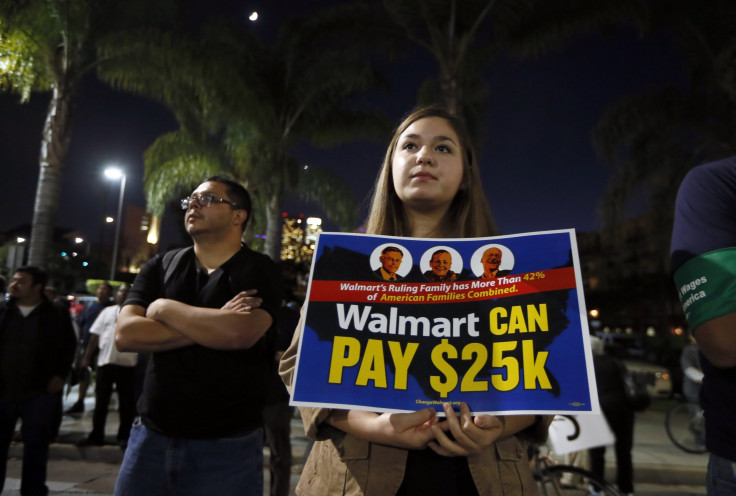Walmart's Low-Wage Employees Gain New Hope From Obama's State Of The Union Address, But Can He Deliver?

The debate over the minimum wage in the U.S. got prime time as part of President Obama’s State of the Union speech on Tuesday night, as he announced plans to increase the minimum wage for future federal contract workers to $10.10 an hour and promised to work with Congress to offer the same increase across the country.
Advocating for those who have been left behind in the modern economy, the president said, “Those at the top have never done better. But average wages have barely budged. Inequality has deepened. Upward mobility has stalled."
“The cold, hard fact is that even in the midst of recovery, too many Americans are working more than ever just to get by, let alone to get ahead,” he added. “And too many still aren’t working at all. So our job is to reverse these trends.”
According to Obama, today's federal minimum wage is worth 20 percent less than when Ronald Reagan gave his first State of the Union address more than 30 years ago. It's currently set at $7.25 per hour, where it's been since July 2009. Obama's proposals look to change that.
However, Republicans came out of in force to protest Obama saying he'll use his executive power to increase the federal minimum wage. Rep. Steve King of Iowa, for one, said that would be unconstitutional.
“I think it’s a constitutional violation,” King said. “We have a minimum wage. Congress has set it. For the president to simply declare, ‘I’m going to change this law that Congress has passed,’ is unconstitutional. He’s outside the bounds of his Article II limitations.
“This threat that the president is going to run the government with an ink pen and executive orders, we’ve never had a president with that level of audacity and that level of contempt for his own oath of office,” King added.
But for many, Obama’s words represent a beacon of hope that could enable millions of people to become more independent and cut the chains of government assistance.
None more so than the low-wage workers at companies like Wal-Mart Stores Inc. (NYSE:WMT), McDonald's Corporation (NYSE:MCD) and KFC, a unit of Yum Brands (NYSE:YUM).
“It definitely would make a difference to me,” said Tiffany Beroid, a supervisor at Walmart. “I currently make $10.70 [an hour], and having the entry-level people start out at $10.10 would mean I would get a small pay raise, and it would help us all become more independent and stop depending on government assistance to get by.”
Beroid has worked at the Laurel, Md., branch for two and a half years, doing around 24 hours a week in her part-time supervisor position. That’s a little over $1,000 per month. She used to be full time but had to cut back her hours because child care for her youngest daughter was too expensive. It was more beneficial for her to cut her hours and claim government assistance to look after her two daughters.
While Beroid’s situation is better than that of Walmart workers who earn the $7.25 minimum wage, Obama’s words have given her and her colleagues renewed hope. They say a raise could help end the sort of situation that was exemplified by a corporate message sent over Thanksgiving last year, in which Walmart employees were encouraged to donate food to each other.
“The fact that he’s addressing the problem makes me feel very confident that he could change America,” Beroid said. “It keeps us below poverty wage, but if it passes, it could take us to the next step of being independent -- not having to live our lives living off government assistance, and that can really make you feel whole as a person.”
It’s true, Obama has addressed the problem, but he talked about it in his 2013 State of the Union address too, calling on Congress to raise the minimum wage to $9 an hour. And that never happened. He and Congress now have a little over 11 months to prove to people like Beroid and other low-wage workers in America that they can live up to expectations and make 2014, as Obama said, a year of action.
© Copyright IBTimes 2024. All rights reserved.












